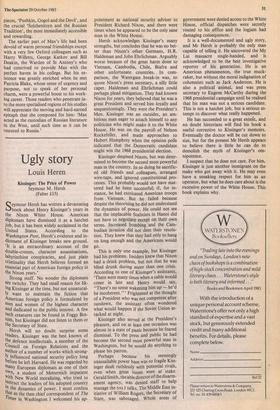Ugly story
Louis Heren
Kissinger: The Price of Power Seymour M. Hersh (Faber £15)
Seymour Hersh has written a devastating book about Henry Kissinger's years in the Nixon White House. American diplomats have dismissed it as a hatchet job, but it has been widely acclaimed in the United States. According to the Washington Post, Hersh's evidence and in- dictment of Kissinger breaks new ground. It is an extraordinary account of the double-crosses, character assassinations, labyrinthine conspiracies, and just plain criminality that Hersh believes formed an essential part of American foreign policy in the Nixon years.'
Strong stuff. No wonder the diplomats are twitchy. They had small reason for lik- mg Kissinger at the time, but not unnatural- 1Y want to maintain the fiction that American foreign policy is formulated by linen and women of the highest character and dedicated to the public interest. A few such creatures can be found in Foggy Bot- tom, but Kissinger did not listen to them or the Secretary of State.
Hersh will no doubt surprise some readers. Kissinger was the best known of the defence intellectuals, a member of the Council on Foreign Relations and the author of a number of works which strong- 1Y influenced national security policy long before he left Harvard. He was regarded by rrtanY European diplomats as one of their clv:int a student of Metternich impatient w. 1th New World moralising, who tried to nistruct the leaders of his adopted country 111 the dynamics of power. I must confess that as the then chief correspondent of The Times in Washington I welcomed his ap-
pointment as national security adviser to President Richard Nixon, and there were times when he appeared to be the only sane man in the White House.
Hersh acknowledges Kissinger's many strengths, but concludes that he was no bet- ter than Nixon's other Germans, H.R.
Haldeman and John Ehrlichman. Arguably worse because of the great harm done to Vietnam, Cambodia, Chile, Biafra and other unfortunate countries. In com- parison, the Watergate break-in was, to quote Nixon's press secretary, a silly little caper. Haldeman and Ehrlichman could perhaps plead mitigation. They had known Nixon for years, they believed that he was a great President and served him loyally and unquestioningly. They were the President's Men. Kissinger was an outsider, an am- bitious man eager to attach himself to any politician who might make it to the White House. He was on the payroll of Nelson Rockefeller, and made approaches to Hubert Humphrey when the opinion polls indicated that the Democratic candidate might win the 1968 presidential election.
Kissinger despised Nixon, but was deter- mined to become the second most powerful man in the country. In so doing he sacrific- ed old friends and colleagues, arranged wire-taps, and ignored constitutional pro- cesses. This probably would not have mat- tered had he been successful; if, for in- stance, he had extricated American troops from Vietnam. But he failed because despite the theorising he did not understand the dynamics of power. He could not see that the implacable Stalinists in Hanoi did not have to negotiate except on their own terms. Increased bombing and the Cam- bodian invasion did not dent their resolu- tion. They knew that they had only to hang on long enough and the Americans would
go.
This is only one example, but Kissinger had his problems. Insiders knew that Nixon had a drink problem, but not that he was blind drunk during more than one crisis. According to one of Kissinger's assistants, 'There were many times when a cable would come in late and Henry would say, "There's no sense wakening him up — he'd be incoherent."' Frightened at the thought of a President who was not competent after sundown, the assistant often wondered what would happen if the Soviet Union at- tacked at night.
Kissinger also served at the President's pleasure, and on at least one occasion was almost in a state of panic because he feared dismissal. To the press and public he had become the second most powerful man in Washington, but he would do anything to please his patron.
Perhaps because his seemingly unassailable power base was so fragile Kiss- inger dealt ruthlessly with potential rivals, even when great issues were at stake. Gerald Smith, the able director of the disarm- ament agency, was denied staff to help manage the SALT talks. The Middle East in- itiative of William Rogers, the Secretary of State, was sabotaged. Whole areas of government were denied access to the White House, official dispatches were secretly routed to his office and the logjam had damaging consequences.
It is a well-documented and ugly story, and Mr Hersh is probably the only man capable of telling it. He uncovered the My Lai massacre single-handed, and is acknowledged to be the best investigative reporter of his generation. He is an American phenomenon, the true muck- raker, but without the moral indignation of columnists such as Jack Anderson. He is also a political animal, and was press secretary to Eugene McCarthy during the 1968 presidential campaign until he realised that his man was not a serious candidate. This is not a hatchet job, but a serious at- tempt to discover what really happened.
He has succeeded to a great extefit, and no doubt historians will find his book a useful corrective to Kissinger's memoirs. Eventually the doctor will be cut down to size, but for the present Mr Hersh appears to believe there is little he can do to demolish the myth of Kissinger's om- nipotence.
I suspect that he does not care. For him, Kissinger is just another immigrant on the make who got away with it. He may even have a sneaking respect for him as an operator, but what he does care about is the excessive power of the White House. This book explains why.














































 Previous page
Previous page